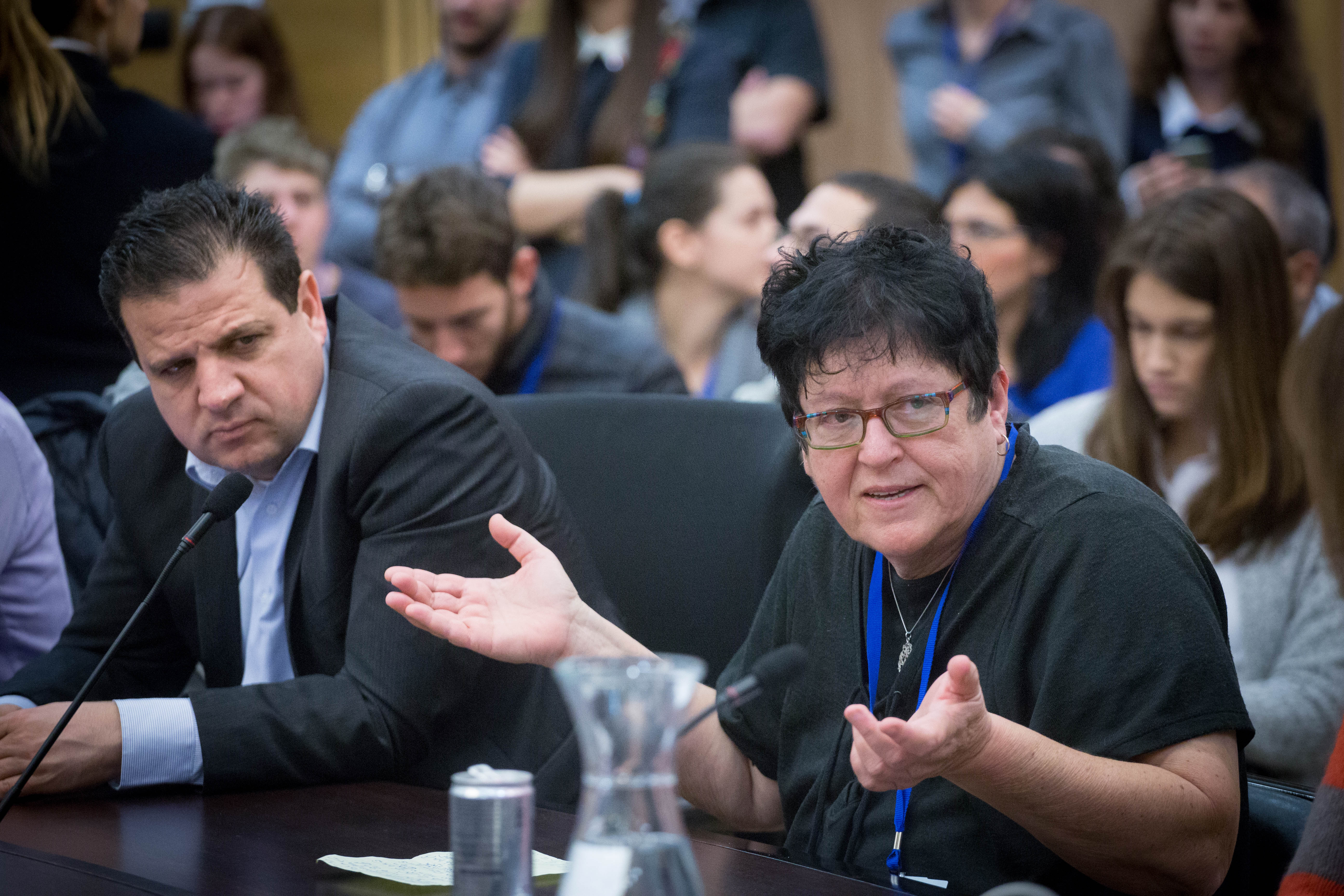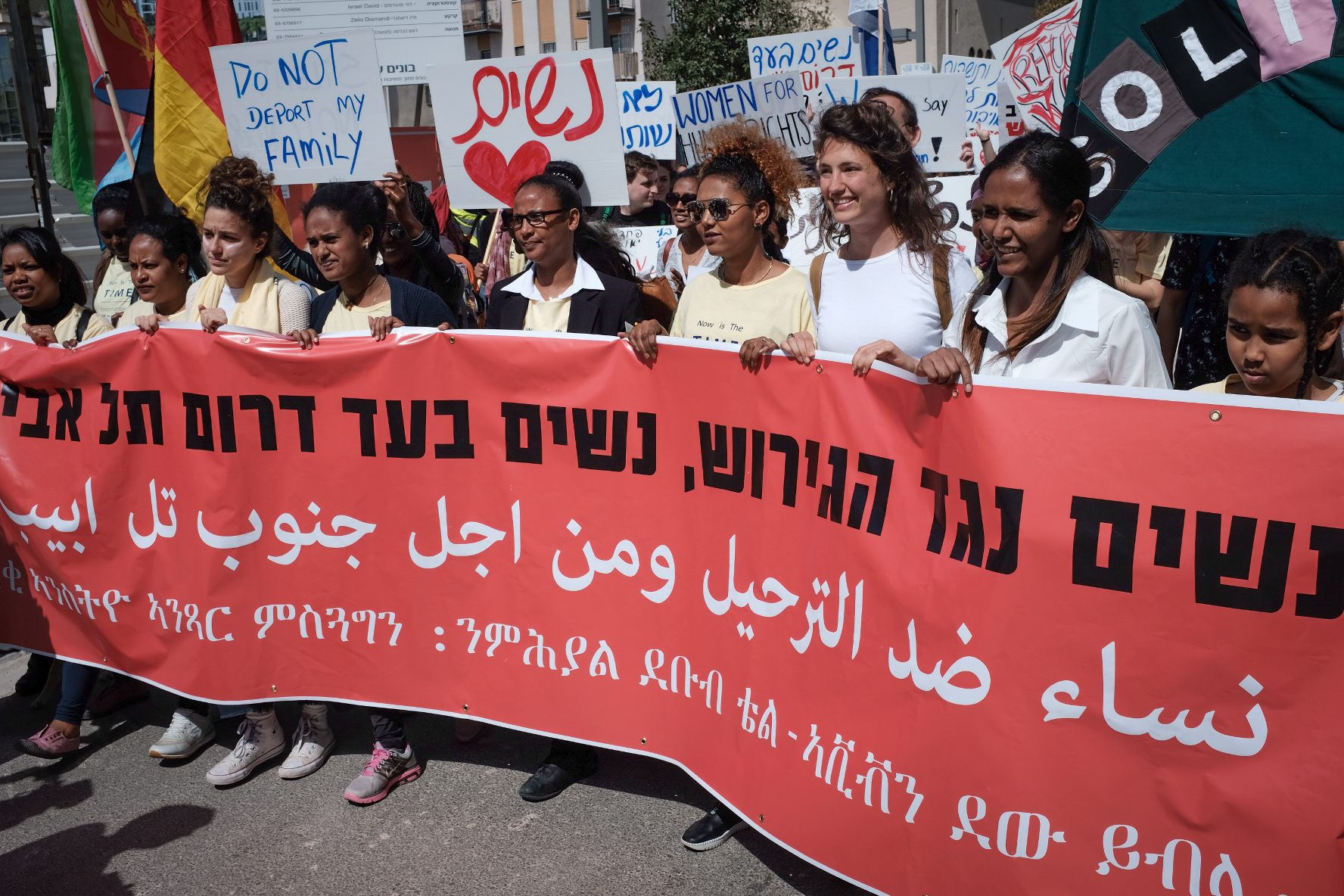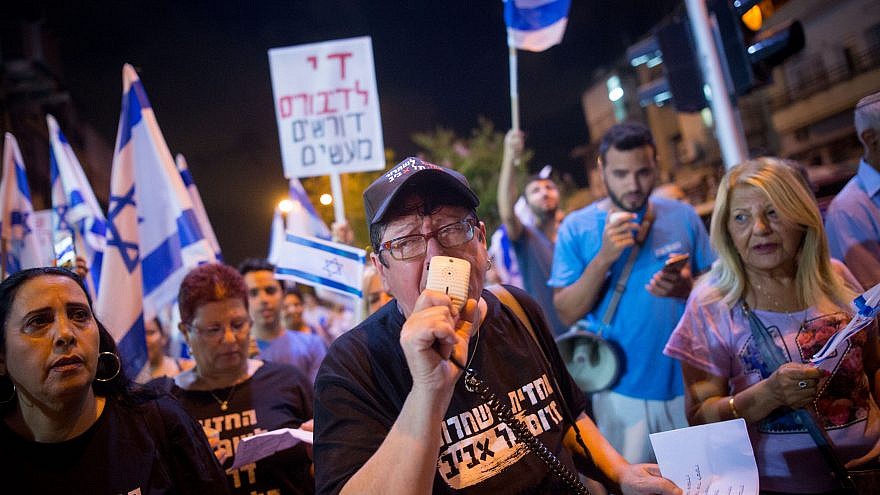Sheffi Paz, the leader of the struggle to evict illegal immigrants from her south Tel Aviv neighborhood, has become a nationally recognized figure in Israel. She herself is not sure when or how it happened. “You’d need a sociologist to investigate the phenomenon,” she jokes.
What makes her unusual is that she spent most of her life as a left-wing activist. While her main efforts revolved around LGBT rights, she held all the views one would expect from a devoted leftist: “I was against the settlements, against the occupation, against the Haredim, against the ‘fascists,’ against anyone who supported Bibi [Israeli Prime Minister Benjamin Netanyahu]. I was in a bubble where everyone thought the same, voted the same.”
The greatest testament to her influence came in April. Netanyahu announced a deal with the U.N. Relief Agency only to cancel it within 24 hours after Paz and her colleagues refused to give their blessing. Internet jokes abounded: “Hamas cease-fire drafted. Bibi seeks approval from Sheffi.”
JNS recently sat down with Sheffi Paz at a south Tel Aviv cafe to learn about the latest developments in her efforts to deport the illegals—mainly from Eritrea, but also from Sudan and Somalia.
Q: What is it like living in South Tel Aviv with illegal immigrants?
A: Let me first say that I moved here for economic reasons 25 years ago. It will sound ironic, but the second reason I chose south Tel Aviv was because it was a multicultural neighborhood. The rest of Tel Aviv is too monolithic for my taste. And I met many good people from Colombia and Ghana.
What happened with the immigrants from Eritrea and Sudan was that there were too many, and they completely changed the nature of the place. You can take 20 percent, 30 percent of the population. The moment the immigrants become the majority, you feel you’re not at home. And you didn’t invite them. And so you say to yourself, “What’s going on?”
I live in Israel. I’m a Zionist. When I asked my father as a I child why he came to Israel and didn’t go to Australia or Canada like the rest of his family, he said something very basic: “I wanted to raise my children in a place where they’ll never hear the words “Yid” or “Kike.”
I have an unwritten agreement with my country. A state that is defined as a Jewish state is supposed to have a Jewish nature. I live in Africa? The people in the streets are not Israelis. The rules of behavior in the street are not Israeli. The language you hear is not Hebrew. You walk around in your neighborhood like a stranger.
On Shabbat, the people that go to prayers are not Jewish. You don’t see Jews in white going to synagogue here. Instead, it’s Eritreans in white. The majority are Christians. There are a multitude of their churches in the neighborhood. They moved the prayers to Saturday because they work on Sunday. So what happens is instead of a Shabbat of Jews and synagogues, there’s one of Christians and churches.
The crime in the neighborhood, which was there before, has skyrocketed. In the first years, this was essentially crime for survival. Now it’s crime of drug addicts and drug dealers, prostitution, theft and home break-ins. And, of course, sex crimes. Much of the crime is directed against themselves, including street skirmishes and stabbings almost every weekend. Since the deportation order was cancelled, the crime has been on a steep climb, as if they feel they can do whatever they want and no one will stop them.
Q: Can you explain what the danger is of letting 44,000 illegal immigrants stay in Israel?
A: It’s not 44,000. It’s more like 50,000 or 60,000. The danger isn’t tied specifically to the number. The danger starts with the challenge to the Zionist nationalist idea. We are a Jewish state. Israel will welcome Jews that come to her. She’ll take in Jews that need her. We’re in the Middle East, in a continuous war, facing worldwide hatred. We need to hold onto this land.
There’s an additional problem. The immigration camps in Libya and Egypt team with millions of people. They’re looking for a place to go. Europe is now closed. What stops them from coming here is that they feel there’s no future here. Let’s imagine we give them legal status. They have telephones. The news gets out. What prevents immigrants from turning around and arriving in Israel? It’s the same Mediterranean. Can you see the Israeli Navy shoot at refugees? Never. Can you see the Israeli Navy dragging leaky boats back to sea? That won’t happen either. We’ll be forced to take those immigrants, too.
Q: Polls show two-thirds of the Israeli public support deporting the immigrants. The government is in favor as well. So what is the difficulty?
A: There’s a Catch-22. It’s impossible to deport the Sudanese. Sudan is an enemy state. According to the United Nations, it’s impossible to deport someone by force to an enemy state. In any case, a large portion of the Sudanese have left.
The Eritreans are a simple story. It’s a dictatorship. It’s a very poor country. Around a third of Eritrea’s GNP is from those who send money home to their families. Israel is not allowed to deport a person to Eritrea if the Eritrean government doesn’t agree. I said to Bibi in a meeting last week: “We have diplomatic relations with Eritrea. We have defense business with Eritrea. Put pressure on them.”

Q: Why doesn’t Netanyahu do that?
A: I don’t know. This same person who puts pressure on America to cancel the nuclear deal with Iran doesn’t seem capable of closing some business with an African dictator.
Q: What is the situation now with your efforts to deport illegal immigrants?
A: At the moment, another U.N. agreement is on the table. I won’t agree to any U.N. agreement under any circumstances.
Q: That plan would evict about 16,000, or half the immigrants, and the rest would stay in Israel?
It’s not half. Sixteen thousand are to be deported. Sixteen thousand receive status here in Israel. Another 15,000 nobody talks about. There isn’t any obligation that the deportation will happen. There’s nothing concrete. The draft agreement is a joke.
There’s an atmosphere in Israel of approaching elections. Likud will have a plan. The Kulanu Party will have a plan. The Yesh Atid Party will have a plan. We introduce elements into these plans and say without them, it’s impossible. Quiet work behind the scenes puts pressure on the government.
Q: You have experienced many ups and downs in your struggle. Just as it seems you’ve won, left-wing groups or the courts stop you.
A: We were on the threshold of success. Take the first immigrant law, for example. It established the Holot installation [ed. note: Living quarters near the Egyptian border where illegal immigrants from Eritrea and northern Sudan were temporarily held.] Argue with the method or not, it worked beautifully. Then the Supreme Court emasculated the law. There was a second law that wasn’t quite as good. The Supreme Court again rejected it. The third time the law was so bad that we told the government it was better off dropping it.
Combine this with the fact that the government didn’t really have the willpower. And the left is wonderfully organized. It has tremendous funds. So they block one thing after another. Of course, they never come up with solutions of their own.
Q: Why are you opposed to dispersing the immigrants throughout the country?
A: For years, we talked about dispersing them. We demonstrated for dispersion. We wouldn’t have needed the government for a dispersion plan. We talked to the left—face to face. We said disperse. You have the kibbutzim. You have established communities. Let’s go to work.
Q: Why didn’t the left join you?
A: After the second or third demonstration, the left put us under the heading: “violent racists.” They were quick to stand on the side of the immigrants.
I went to two large demonstrations against us. And I saw where these people come from. Yes, a few come from the left here in the neighborhood. The rest were bused in from all over. It’s the hypocrisy—that they clear their consciences this way, feeling heroic as if they’re fighting fascism. We call them out on it. We say with a wry smile, “Don’t leave empty-handed. Bring one refugee home with you.”
And to take a step back, this community is made up of traditional Eastern Jews, right-wing voters. When I first entered the struggle, I tried to arrange a discourse, to create some kind of partnership. The left said, “Come on, let’s do a press conference.” And I said, “Friends, hold on, build some trust first. These people are suspicious of you.” After several conversations, the people in the neighborhood said, “Cut it off. We don’t want to talk with them. We can’t stand united with people—this was during “Operation Protective Edge”—who attack the IDF.”
The insult is enormous. Here again, we have the educated, rich, left-wing Ashkenazic Jews dropping everything on the heads of the Eastern Jews. They come in once a month, take the children of illegals to the public park, buy them sweets, play with them a little and return home where there isn’t a single illegal immigrant.

Q: We’ve recently seen images broadcast of fighting in Tel Aviv streets between Eritreans. They are fighting over the regime there. What did you think when you saw that?
A: First, you should know that all the video that’s on television, we filmed that. We decided not to put our logo on it.
I’ll tell you the Eritrean narrative and then ours. Their narrative is that there are 4,000 government supporters among the immigrants—some of them agents taking salaries—and their goal is to terrorize the rest of the immigrant population so they won’t tell the truth about what’s going on in Eritrea. They’re the ones who start the riots, and the rest suffer as a result. They ask that we evict the government supporters.
The real case is that there is a small group of Eritreans who oppose the regime. They are political refugees. Young people here have joined them. It’s a lot of fun to be against the government, especially if you’re opposing it from a cafe in Ra’anana. There is also a small group of government agents and a very large group of immigrants seeking employment. To present their population as a small group of government supporters and all the rest opponents of the regime who should receive refugee status is just B.S.
The people throwing stones at the central bus station were opponents of the regime, not supporters. I know this because I know who they are.
Q: Have those images impacted your efforts?
A: In a good way. People say enough—up to here. Right now, they fight among themselves. But tomorrow, will it be against me? A year from now, will I get a rock on my head? There’s absolutely no difference in the methods of the two sides. Their tactics, the violence, they bring it here.
Q: Of your political opponents, which is the most effective in your view?
A: The Supreme Court is the most problematic. Really, it’s the partnership between left-wing groups and the Supreme Court—that combination is the most dangerous. They’re all part of the same social milieu.
Q: What do you think of the Override Law meant to rein in the Supreme Court – will that solve the issue?
A: I don’t think the Supreme Court will let it pass. Because even if the Override Bill is passed, it will need to pass the justices. The method of the Supreme Court is first to drag things out, and then gut it.
Q: As someone from the left, can you give us some insight into their thinking?
A: I was on the left for many years. I had this feeling of being on the side of justice, morality, purity—I was battling evil. You’re on the side of nature and goodness. It’s a big part of it.
Q: What motivates the left-wing opposition on this issue?
A: It depends on the group. They have an anti-Zionist agenda. I’m not saying they don’t love Israel. But they don’t want a state that’s a Jewish state. They say this themselves. And this issue of immigrants undermines the Jewish state. That’s one section. A big part of the opposition works for a paycheck. They make a living from it. And then there are a lot of useful idiots who want to feel good about themselves.
Q: How did you become leader of a movement in which most members identify with the political right?
A: I’m here, and I see what’s happening. And I talked with the left, and the left threw me out. I was terribly disappointed. … And I said, “Wait a minute, if they’re lying about things I know for a fact, what else are they lying about?” They attacked me personally, calling me a Nazi. After years of being on the left, it’s very difficult to raise your head and say you’re on the right. I’m independent right. It’s a very difficult process. You lose your friends. You lose the support of your group. You change your thinking.
Q: Have the immigrants themselves become more sophisticated in their opposition?
A: Very much so. They already understand Israeli society. They open businesses by getting an Israeli to apply for the permit. They know how to claim their rights. They conduct negotiations with the police. They’re a clever group.
Q: The man who murdered the Holocaust survivor Esther Galili eight years ago was stopped by police before the murder for acting suspiciously. He said to the police, “This is my land just as much as it is yours.” Is that an attitude that’s common among them?
A: “This is a land of refugees. And we’re refugees just like you.” Yes. You don’t hear these kinds of sentences from the Filipinos or the Thais. Even the non-Jewish Ukrainians who try to cheat the system and say they’re refugees don’t say that. The Eritreans shout this at us. They taunt us with it. They say, “This is my land.” They come to Knesset committee meetings. Also with the media, they send the best ones, those who are educated and speak Hebrew.
Q: Is there a moment where we reach a point of no return? Where it has taken too long to remove the immigrants, and it will be impossible to do so?
A: Elections are coming. In the elections, this will be one of the two or three most important issues. I took a local issue about just another neighborhood in south Tel Aviv and turned it into a national issue. Not only into a national issue, but one on which the government needs to act. If we speak about success, that’s my biggest. The question is, in the end will it bring results? A new generation of illegals is being raised. The second generation will be the most difficult. There’s a lot of hatred there, a lot of anger. This period is critical. The moment of no return isn’t far off.


























